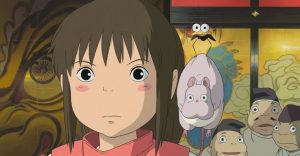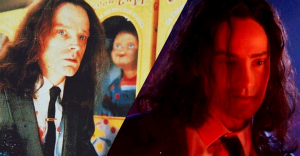South Park: 10 Must-See Episodes From Seasons 1-5

While South Park took a few years to find its feet as a vehicle for social commentary, Trey Parker and Matt Stone’s animated satire has always been one of the funniest shows on TV. Its early seasons broke all kinds of new ground for television comedy, often at the cost of widespread moral panic and a myriad of complaints being levied at Comedy Central.
The show’s greatest episodes, like “Casa Bonita” and “All About the Mormons,” might have come later in the series’ more than two-decade run, but there are still plenty of gems to be found in the first few seasons of South Park.
10 Cartman Gets An Anal Probe (Season 1, Episode 1)

When a show becomes as long-running and monumental as South Park, it’s fun to revisit the pilot episode and see how that lasting legacy began. “Cartman Gets an Anal Probe” still holds up as a hilarious episode of South Park, even if it has none of the social commentary that would go on to define the series.
The pilot episode remains the only episode of South Park with no computer animation; it was painstakingly animated with the construction paper cutouts that would become the series’ signature visual style.
9 Big Gay Al’s Big Gay Boat Ride (Season 1, Episode 4)

The first time Trey Parker and Matt Stone used South Park as a vehicle for poignant satire was in season 1’s “Big Gay Al’s Big Gay Boat Ride,” in which Stan learns that his dog Sparky is gay. Open discussion of homosexuality was rare at the time and the episode was nominated for a GLAAD Media Award (although it lost to The Simpsons’ “Homer’s Phobia,” which tackled similar issues).
This was back when Parker and Stone indulged celebrities who offered to guest-star on the show. Sparky, who speaks only in barks throughout the whole episode, is played by George Clooney.
8 Mecha-Streisand (Season 1, Episode 12)

Most of the time, when Parker and Stone lampoon a celebrity on South Park, it’s nothing personal and they’re just trying to be funny.
But every once in a while, a famous person gets to them and they mock them on the show out of spite. And so goes Barbra Streisand, who was depicted as a kaiju monster in season 1’s “Mecha-Streisand.”
7 Gnomes (Season 2, Episode 17)

Parker and Stone have often used South Park to weigh out the advantages and disadvantages of capitalism. Season 2’s “Gnomes” is an early example in which the Tweeks’ family-run coffee shop is threatened by the onslaught of Harbucks, a major chain (and thinly veiled parody of Starbucks).
This episode looks at the issue from both sides and makes a strong case for each. Plus, the business plan meme (“Collect underpants,” “?,” “Profit”) originated in this episode.
6 Chinpokomon (Season 3, Episode 11)

Season 3’s “Chinpokomon” parodies the popularity of the Pokémon franchise with a Japanese conspiracy to brainwash American children to attack Pearl Harbor.
It’s a spot-on lampoon of fads that come and go, complete with video games that give children seizures and baffled parents who can’t understand why their bank accounts are being drained to collect silly little toys. Fun fact: the name of South Park’s spoof of Pokémon is taken from “chinpo” or “chinpoko,” a vulgar Japanese slang word for “penis.”
5 Cartman Joins NAMBLA (Season 4, Episode 5)

For context, the organization in the title of season 5’s “Cartman Joins NAMBLA” is the North American Man/Boy Love Association, which advocates pedophilia and seeks to abolish age-of-consent laws.
When Cartman decides he’s too mature to keep hanging out with his eight-year-old friends, he takes to the internet to meet some adults. It’s one of South Park’s most delightfully dark installments.
4 The Wacky Molestation Adventure (Season 4, Episode 16)

Kyle sets a dangerous precedent when he accuses his parents of molestation and gets them arrested. Soon, every kid in South Park does the same until there are no more grownups left in town.
The episode then becomes a hysterical parody of Stephen King’s Children of the Corn as a couple are stranded in the town and freaked out by the violent cults of children running the place.
3 It Hits The Fan (Season 5, Episode 1)

In the fifth-season premiere “It Hits the Fan,” South Park tackled censorship. When the word “s***” is uttered on network television, the town re-evaluates its attitude toward cursing and starts saying “s***” all the time. Throughout the episode, there’s a “s***” counter in the corner of the screen tallying uncensored uses of the word.
As the town starts swearing all the time, strange things begin to occur, and the ghost of a medieval knight tells the boys that the “curse” in “curse word” is all too literal.
2 Scott Tenorman Must Die (Season 5, Episode 4)

Often named as the greatest episode in South Park’s storied history, “Scott Tenorman Must Die” was certainly the turning point that established the harrowing depths of Cartman’s evil and the pitch-black comic tone of the series going forward.
When Cartman is scammed by an older kid, he sets out to exact revenge. After several unsuccessful attempts, he pulls the rug out from under everyone (including his friends and the cops) when he reveals a hauntingly diabolical scheme.
1 Osama Bin Laden Has Farty Pants (Season 5, Episode 9)

Just like “The Pandemic Special” came along earlier this year to alleviate the 2020 blues, South Park stepped in to help heal America in the wake of the 9/11 attacks with a healthy dose of satire.
“Osama Bin Laden Has Farty Pants” aired less than a month after September 11th, 2001, and used humor to capture the paranoia and uncertainty that was being felt across the country.
About The Author


















